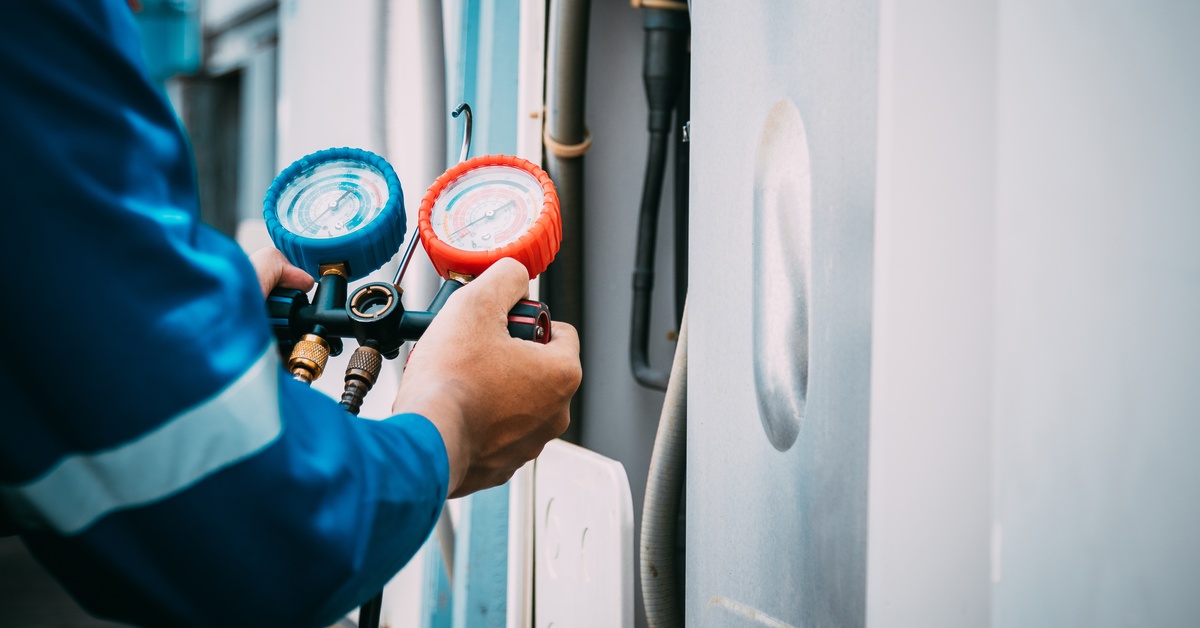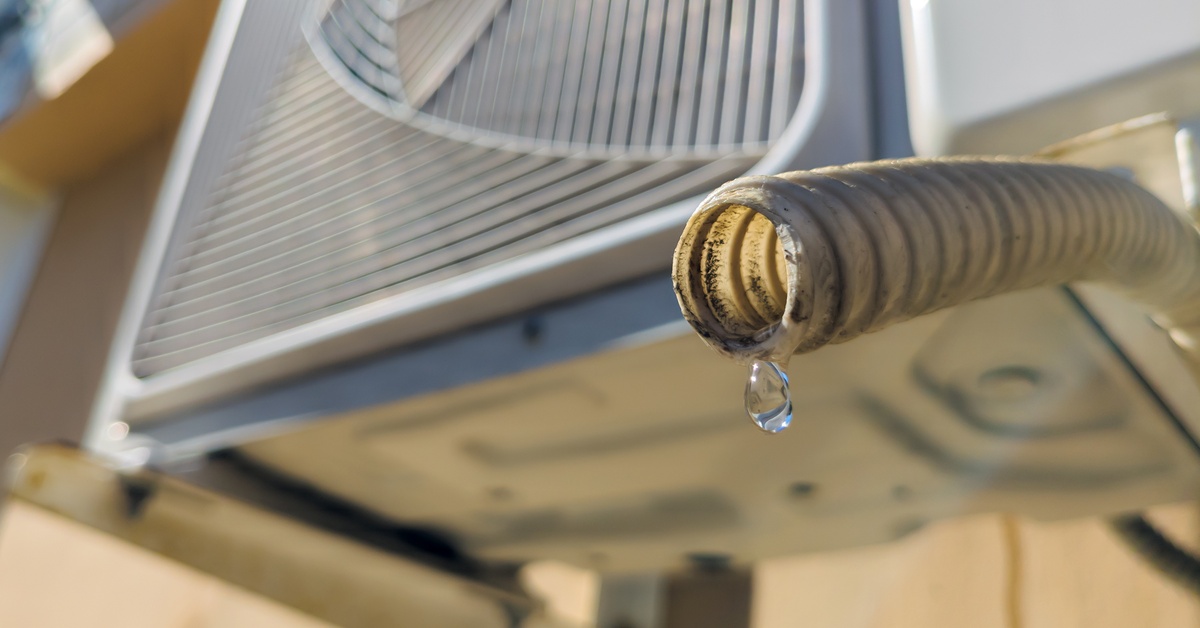Walking into a room only to find water pooling under your AC unit is a stressful surprise that no homeowner wants to deal with. Water drips or pools near your AC unit could mean anything from a simple maintenance issue to a more serious mechanical failure. Tackling the cause of a water leak early is essential to avoid costly repairs or damage to your home. This guide explores what it means when your AC leaks water and how to fix it.
Clogged Drain Line
The drain line in your air conditioner carries condensation away from the unit and drains it outside your home. Over time, this drain line can become clogged with dirt, debris, and algae buildup. When this happens, the gunk is almost like a dam; it blocks the water’s path, giving it nowhere to go. This leads to water building up in the line, eventually backing up, and leaking out.
When your drain line becomes clogged, you’ll have to get it unclogged to prevent any potential damage to your air conditioning unit and home. Here are a few ways you can unclog a clogged drain line:
- Using a wet/dry vacuum: Connect the vacuum hose to the drain line and use it to remove any blockages or debris.
- Using a plumbing snake: Insert the snake into the drain line and turn it to clear any blockages.
- Using hot water and dish soap: Pour a mixture of hot water and dish soap down the drain line to dissolve any buildup.
You may have to try a combination of these methods or repeat them multiple times to fully unclog the drain line. Additionally, remember to regularly clean and maintain your drain line to prevent future clogs.
Damaged Drain Pan
The drain pan helps catch condensation to ensure it doesn’t drip onto other parts of the unit. However, the drain pan can wear out as air conditioners age due to rust, corrosion, or cracks, leading to water leaks. Rust and corrosion can naturally occur because of constant exposure to moisture, while cracks can form due to wear and tear over time.
Ideally, you should clean and inspect your drain pan at least once a year to catch any damage early on. If you notice any cracks or signs of wear, replace the drain pan as soon as possible to prevent water damage to your unit and home.
Low Refrigerant Levels

Refrigerant is vital in cooling your home efficiently, but if the levels get too low, it can disrupt the entire system. When refrigerant decreases, the evaporator coils can no longer maintain the correct temperature. This pressure drop can cause the coils to freeze, resulting in water leaks once the frozen condensation melts.
Low refrigerant levels often indicate a leak somewhere in the system or improper maintenance. Refilling refrigerant without locating the source of the leak will only provide a short-term solution. Call a professional to locate and repair leaks before recharging the system to its optimal level.
Dirty Air Filter
If your air conditioner leaks water, it could mean that your air filters are clogged and restricting airflow. This lack of airflow can cause the evaporator coils to overwork, often leading to freezing. Once these frozen coils thaw, the excess water may leak from the unit.
Replacing the air filter regularly reduces the chances of this issue occurring. A clean filter allows air to circulate freely, preventing strain on internal components and helping the system run more efficiently.
So, how often should you replace your air filters? Giving a specific answer here is difficult because it depends on various factors, such as whether you have pets, suffer from allergies, or have a larger home. Generally, you should check your air filter every 1-3 months and only replace it if it appears dirty.
Frozen Evaporator Coils
If you notice excessive dripping or water puddles near the AC, frozen evaporator coils could be the cause. These coils can freeze when airflow becomes restricted or refrigerant levels are too low. When the system shuts off, the frozen coils thaw, and the resulting water often overflows and causes water puddles.
You can check and inspect the air filter for dirt or clogs to address and fix this issue. A dirty filter restricts airflow, which may lead to frozen coils. Replace or clean the filter as needed to restore proper air circulation. If cleaning the filters and clearing the vents don’t solve the issue, hire an HVAC technician to check and recharge the refrigerant if necessary.
Pro Tip
Turn off your AC system until the frozen coils have completely thawed. Running the unit with frozen coils can cause further damage, such as compressor failure.
Improper Installation
Some HVAC technicians are better than others, and improper installation can lead to long-term issues, including water leaks. For example, one common installation mistake is failing to level the AC properly. A unit that isn’t level can cause water to pool in the wrong areas rather than drain as designed. Over time, this pooling can lead to leaks and damage to the unit.
Another frequent error involves poorly connected or misaligned drain lines. If the drain line isn’t securely attached or properly angled, condensation may not flow away from the system efficiently, resulting in water backing up and spilling around the AC.
When hiring an HVAC installation company, read through reviews and ask for recommendations. Look for companies with experience installing units similar to the one you’re purchasing, and make sure they are licensed and insured.
What To Do Next

Addressing the issue quickly will help prevent further damage and ensure your system runs effectively. Here are three key steps to help you tackle the problem and maintain a well-functioning AC unit.
Maintain Your AC Unit
Regular maintenance keeps your HVAC system working as it should and lets you notice potential problems before things snowball. While you can check the outside of the unit yourself, you should schedule annual maintenance with an HVAC company for an in-depth look at the appliance. A trained expert can identify potential problems, such as worn-out drain pans or low refrigerant levels before they turn into costly repairs.
Don’t Overwork It
While it can get quite hot in summer, turning the AC as low as possible isn’t always the best solution, as it forces your AC unit to work harder. The more stress you put on your AC, the shorter its lifespan.
Instead of constantly adjusting the temperature to an extreme level, try using ceiling fans alongside your air conditioner; this way you can keep the thermostat set to a slightly higher level and maintain a cool home. This will lessen the burden on your AC unit and save you some cash on your electricity bill.
Contact Style Crest
Sometimes, the best solution is to call an air conditioning repair contractor. Style Crest offers professional support to help you with even the toughest AC issues. Whether you’re dealing with a clogged drain line, frozen evaporator coils, or a broken condensate pump, their trained technicians can diagnose and resolve the problem efficiently. Keep your AC unit working properly to enjoy cool and comfortable air all summer.